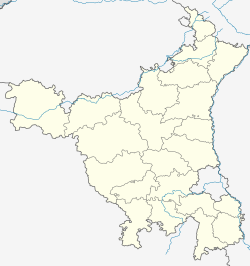Sirsa, Haryana
| Sirsa | |
|---|---|
| City | |
| Location in Haryana, India | |
| Coordinates: 29°32′N 75°00′E / 29.53°N 75.0°ECoordinates: 29°32′N 75°00′E / 29.53°N 75.0°E | |
| Country |
|
| State | Haryana |
| District | Sirsa |
| Government | |
| • Body | HUDA |
| • Member of Parliament | Charanjeet Singh Rori (SAD-Badal & INLD) |
| Elevation | 205 m (673 ft) |
| Population (2001) | |
| • Total | 160,126 |
| Languages | |
| • Official | Hindi, Haryanvi, Punjabi, English |
| Time zone | IST (UTC+5:30) |
| PIN | 125055 |
| Telephone code | 01666 |
| Vehicle registration | HR 24 |
| Nearest city | Bathinda, New Delhi, Chandigarh, Hisar, Sri Ganganagar |
| Lok Sabha constituency | Sirsa |
| Planning agency | HUDA |
| Distance from New Delhi | 263 kilometres (163 mi) W (land) |
| Distance from Chandigarh | 251 kilometres (156 mi) SW (land) |
| Distance from Hisar (city) | 92 kilometres (57 mi) NW (land) |
| Website | sirsa |
Sirsa (Hindi: सिरसा) is a city and municipal council in the Sirsa district of the Indian state of Haryana. It is a town in the westernmost region of the state, bordering Punjab and Rajasthan. Its history dates back to the time of the writing of the Mahabharata. At one time, the Sarasvati River flowed in this area. It is home of Sirsa Air Force Station of Indian Air Force.
There are a number of legends about the origin of the name of the town. Sirsa is said to be one of the oldest places of North India and its ancient name was Sairishaka, which finds mention in the Mahabharata, Panini's Ashatadhayayi and Divyavadan. In the Mahabharata, Sairishaka is described as being taken by Nakula in his conquest of the western quarter. It must have been a flourishing city in the 5th century BC, as it has been mentioned by Pāṇini.
According to local tradition, an unknown king named Saras founded the town in the 7th century AD and built a fort. The remains of an ancient fort can still be seen in the South-East of the present town. It is about 5 kilometres (3.1 mi) in circumference. According to another tradition, the name has its origin from the sacred river Sarasvati which one flowed near it. During the medieval period, the town was known as Sarsuti as noted by a number of medieval historians. In the ancient period, Sirsa was also known as Sirsapattan.
The Sirsa district which comprised three tahsils of Sirsa, Dabwali and Fazilka was abolished in 1884 and Sirsa tahsil (consisting of 199 Villages) and 126 villages of Dabwali tahsil formed one tahsil and the same was merged in the Hisar district and the rest of the portion was transferred to the Firozpur district (Punjab). There was no change till the Independence of the country except that a village was transferred from Sirsa tahsil to the then state of Bikaner in 1906.
The entire area of the district was included in the new state of Haryana on 1 November 1966. In 1968, Sirsa tahsil was bifurcated into Sirsa and Dabwali tahsils. In 1974, three villages of Dabwali tahsil were transferred to Sirsa tahsil. On 1 September 1975, Sirsa and Dabwali tahsils were constituted into a separate Sirsa district with headquarters at Sirsa.
...
Wikipedia


